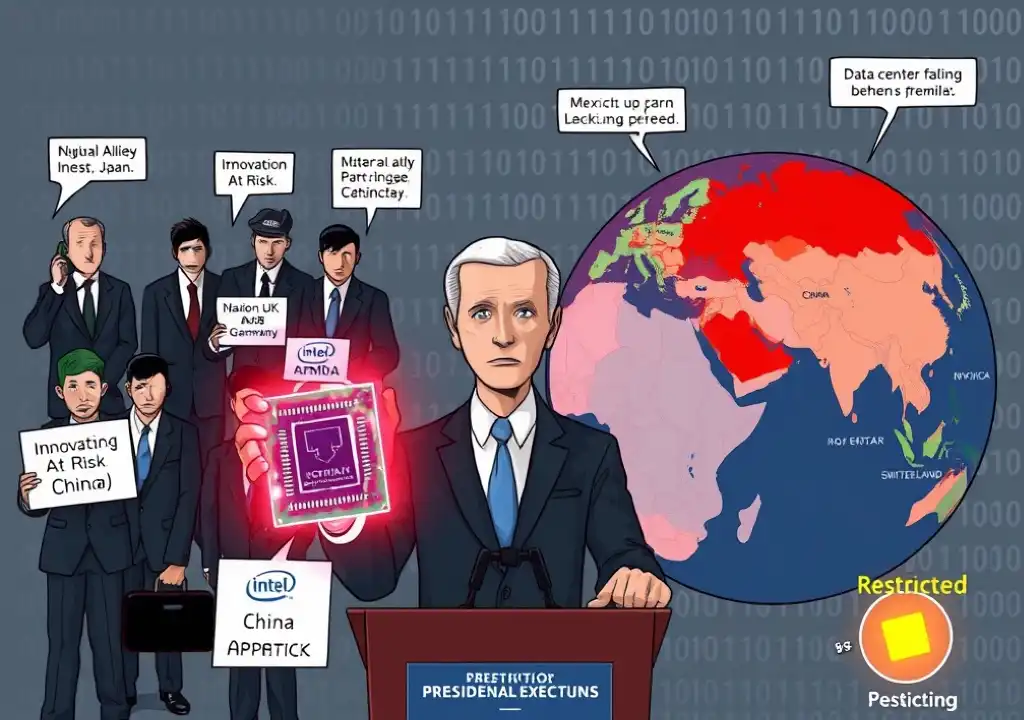The Biden administration has introduced a new framework aimed at controlling the export of advanced computer chips essential for developing artificial intelligence, seeking to balance national security concerns with the economic interests of producers and other countries.
However, the proposed rules, announced on Monday, have raised concerns among chip industry executives, who argue that the new regulations will restrict access to existing chips used in video games and limit AI chips for data centers and AI products across 120 countries. Countries such as Mexico, Portugal, Israel, and Switzerland could face restricted access to these technologies.
Commerce Secretary Gina Raimondo emphasized the importance of maintaining U.S. leadership in AI and the development of AI-related chips. Fast-evolving AI technologies are transforming industries, enabling advancements in areas like scientific research, automated driving, and content creation, while also raising potential national security risks. Raimondo stated that the framework aims to protect the most advanced AI technologies and ensure their availability to partners, while keeping them out of the hands of foreign adversaries.
National Security Adviser Jake Sullivan noted that the framework is designed to ensure the U.S. and its closest allies remain at the forefront of AI development, in contrast to other sectors like batteries and renewable energy, where technologies have been offshored.
Tech industry groups, including the Information Technology Industry Council, warned that the rushed implementation of these rules could fragment global supply chains and disadvantage U.S. companies. The Semiconductor Industry Association (SIA) also voiced disappointment, arguing that the policy could harm America’s semiconductor and AI sectors by ceding strategic markets to global competitors.
An anonymous industry executive familiar with the framework revealed that the restrictions would limit access to chips currently used in video games, contrary to the government’s claims, and hinder which companies can build data centers abroad.
The framework includes a 120-day comment period, during which time the incoming Republican administration under President-elect Donald Trump could alter the rules for chip exports, forcing a balance between national security and economic concerns.
Government officials acted swiftly, believing the U.S. currently holds a six- to 18-month advantage over rivals such as China in AI development. This advantage could quickly dissipate if competitors are allowed to stockpile chips and catch up.
Ned Finkle, vice president of external affairs at Nvidia, argued that the framework, while ostensibly aimed at countering China, would stifle innovation without achieving its national security objectives. He suggested that the rules would unduly restrict globally available technology, including those widely used in gaming PCs.
Under the new framework, approximately 20 key allies, including Australia, Canada, Germany, Japan, South Korea, the UK, and others, would not face any export restrictions. Other countries would be subject to caps on their chip imports. Specific countries could secure government-to-government agreements to raise their limits, with the possibility of institutions obtaining legal status for purchasing larger quantities of advanced chips.
Additionally, imports of up to 1,700 advanced graphics-processing units (GPUs) would not require a license and would not count against the national chip cap, providing an exception for educational and medical institutions. However, these new rules are not expected to affect the expansion of AI-driven data centers for major cloud providers like Amazon, Google, and Microsoft, as they would be exempt under the new framework.
In response, China’s Ministry of Commerce stated that it would take necessary actions to protect its “legitimate rights and interests.”

